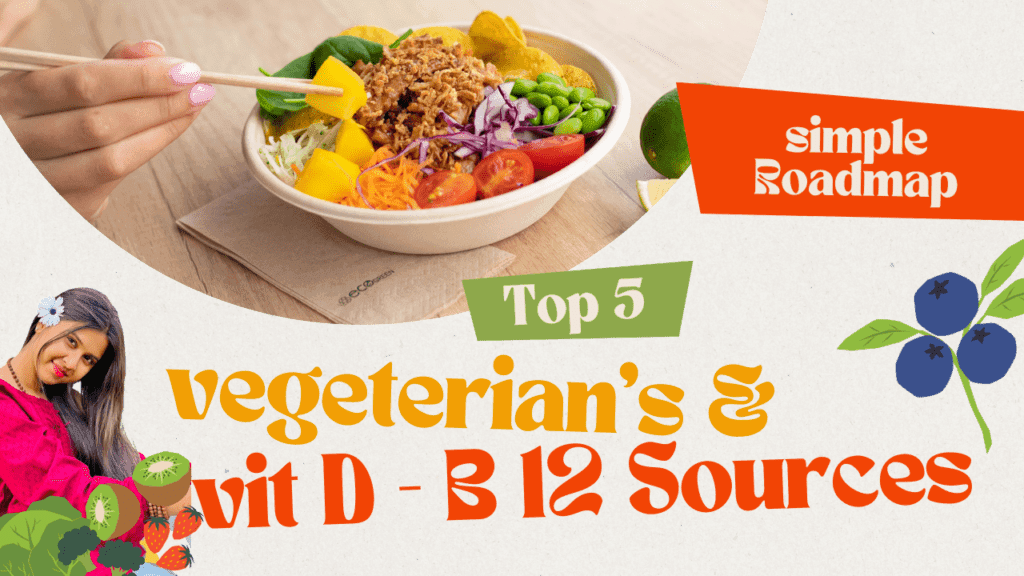Non-vegetarian foods are often considered some of the richest sources of essential nutrients, which can sometimes lead to concerns for those following a vegetarian diet, particularly when it comes to key vitamins like B12 and D.
While supplements can help bridge this gap, there are several natural strategies within traditional Indian dietary practices that can aid in replenishing these nutrients, reducing the worry of deficiencies. By making informed choices, vegetarians can address these nutritional needs effectively.
If you’re looking for personalized guidance, seeking advice from a qualified dietitian (https://reganesh.tech/) online can provide tailored nutrition plans suited to your lifestyle.
Sometimes, it’s helpful to take a moment and truly understand the reasoning and logic behind our choices, as it can lead to more meaningful and sustainable decisions for our health.
The Science Behind Vitamin B12 Absorption:
Vitamin B12, also known as Cobalamin, works in tandem with cobalt to break down proteins in the body. For this process to occur, Pepsin, a digestive enzyme released from the gut lining, plays a crucial role.
However, a key player in Vitamin B12 absorption is the Intrinsic Factor, a protein that helps create a thriving community of beneficial bacteria in the gut, which is essential for the proper absorption of B12.
To effectively absorb Vitamin B12, there are two main things we need to focus on:
1. Prioritize Gut Health
For Vitamin B12 to be absorbed efficiently, your gut needs to be healthy. However, this can be challenging if you suffer from gastric issues.
Your stomach’s pH plays a vital role in the absorption process. Ideally, your stomach’s pH should be in the 1-3 range, which is highly acidic. This acidity is crucial as it activates digestive enzymes, including those needed to release Vitamin B12 from food.
Think of your stomach as a gatekeeper, and the pH level as the secret code. When the stomach’s pH is in the right range, it allows digestive enzymes to break down food and release B12 for absorption.
However, when antacids or antibiotics are overused, they can disrupt this delicate balance. The pH of the stomach becomes less acidic, and the enzymes required for B12 absorption aren’t activated, leading to difficulty in absorbing this crucial nutrient.

2. Maintaining Gut Health and pH Balance
The key to improving Vitamin B12 absorption lies in maintaining a healthy gut. A gut free from issues like acidity, bloating, and constipation creates an optimal environment for nutrient absorption, including Vitamin B12.
Frequent use of antacids can disturb your stomach’s pH, which in turn hampers Vitamin B12 absorption. Similarly, overuse of antibiotics can disrupt gut bacteria, which are vital for nutrient absorption and digestion. To address this, you can consider taking Vitamin B Complex supplements while on antibiotics to maintain a healthy gut flora, support proper absorption, and prevent digestive issues like diarrhea.
How to Support Vitamin B12 Absorption:
- Support gut health: By addressing issues like acidity, bloating, and constipation, you can ensure your digestive system is functioning optimally for Vitamin B12 absorption.
- Avoid excessive antacids: Over-reliance on antacids can hinder your stomach’s ability to absorb Vitamin B12.
- Balance antibiotics: If you need to take antibiotics, consider supplementing with Vitamin B complex to keep your gut bacteria in balance and support the absorption process.
Vegetarian Sources of Vitamin B12:
While gut health is crucial, you can also incorporate vegetarian sources of Vitamin B12 into your diet. Some excellent vegetarian options include fortified plant-based milks, nutritional yeast, fortified cereals, and other B12-rich plant-based foods. These can help fill the gap if your body’s B12 levels are low.
Supplements: When and How to Use Them
If you find your Vitamin B12 levels are still low, supplements may be necessary. However, not all B12 supplements are the same. Methylcobalamin is a form of B12 that works well with the stomach’s acid and is absorbed more effectively. On the other hand, supplements containing cyanide-forming salts can hinder Vitamin B12 absorption.
Therefore, it’s important to consult with your doctor before starting any supplements. Your doctor can guide you in choosing the right type of B12 supplement to match your body’s needs.
Conclusion:
To optimize Vitamin B12 absorption, prioritize maintaining a healthy gut and stomach pH. Avoid overusing antacids and antibiotics, and consider including vegetarian sources of Vitamin B12 in your meals. If needed, speak to your doctor about supplements, and choose the right one to ensure your body can absorb B12 efficiently.
are 8 vegetarian sources of Vitamin B12 that can help you meet your nutritional needs:
1. Fortified Plant-Based Milks
Many plant-based milk options like almond milk, soy milk, oat milk, and rice milk are fortified with Vitamin B12. Be sure to check the labels to ensure they contain added B12, as it’s not naturally present in these beverages.
2. Nutritional Yeast
Nutritional yeast is a popular vegan source of Vitamin B12. It has a cheesy, nutty flavor and is often used as a topping for popcorn, in soups, or sprinkled over pasta. It’s typically fortified with Vitamin B12, so look for that on the label.
3. Fortified Cereals
Certain breakfast cereals are fortified with Vitamin B12, providing a convenient way to boost your intake. Choose whole-grain, low-sugar options that are fortified with B12 for a healthier, nutrient-packed start to your day.
4. Tempeh
Tempeh, a fermented soybean product, is another source of Vitamin B12 for vegetarians. Although it doesn’t naturally contain high amounts of B12, some commercially available tempeh is fortified with it.
5. Fortified Nutritional Supplements
While not a food source per se, B12 supplements that are vegan-friendly (usually in the form of methyl cobalamin) are a good option for vegetarians. These can be especially useful if you’re concerned about getting enough B12 from your diet alone.
6. Dairy Products (for Lacto-Vegetarians)
If you’re a lacto-vegetarian, dairy products like milk, cheese, and yogurt are good sources of Vitamin B12. These foods naturally contain B12, making them excellent choices for those who include dairy in their diet.
7. Green Leafy Vegetables, Moringa powder:
[made from drumstick leaves] and Wheatgrass are great sources of Vitamin B12.
Wheat contains gluten whereas Wheatgrass juice is free from gluten, making it a good source of Vit B12. Consuming Wheatgrass juice before breakfast improves Vitamin b12 absorption.
Whether it’s Moringa powder or leaves, these water-soluble wonders can be added to dal, flour, or water and consumed.
8. Sprouts:
Sprouted dals and lentils offer not only Vitamin B12 but also Vitamin C, enhancing absorption. Add Sprouts to your diet 2-3 times a week. If eating them as raw sprouts feel difficult, try Sautéing or Steaming.
Including these vegetarian sources in your meals can help ensure you’re meeting your Vitamin B12 needs without having to rely on animal-based products.

Signs and Symptoms of Vitamin B12 Deficiency:
- Tingling
- Numbness
- Fatigue
- Forgetfulness/loss of memory (as it is linked to blood’s red blood cells, neuron system, and DNA repair)
- Irritability/ Anger
- Anxiety or Depressed Mood
Vitamin D in a Vegetarian Diet: How to Get Enough Naturally
- Vitamin D is a crucial nutrient for overall health, supporting bone strength, immune function, and mood regulation. While it’s commonly found in animal-based foods, vegetarians can still meet their Vitamin D needs through careful food choices and lifestyle practices.
- Here’s a look at natural vegetarian sources of Vitamin D, how to enhance its absorption, and the role of supplements if needed.
Here are 5 natural vegetarian sources of Vitamin D:
1. Mushrooms (especially sun-dried)
Mushrooms, particularly varieties like shiitake, maitake, and reishi, are among the few plant-based sources of Vitamin D. When exposed to sunlight, mushrooms synthesize Vitamin D, specifically Vitamin D2. Sun-dried mushrooms offer a more concentrated amount of Vitamin D. If you’re looking to boost your Vitamin D intake, incorporating sun-dried mushrooms into your diet can be an excellent vegetarian option.
2. Fortified Plant-Based Milks
Many plant-based milk alternatives, such as almond milk, soy milk, and oat milk, are fortified with Vitamin D. These are excellent options for vegetarians, as they are often enriched with Vitamin D2 (derived from yeast or mushrooms) or Vitamin D3 (derived from lichen). Be sure to check labels to ensure the milk is fortified with Vitamin D.
3. Fortified Cereals
Certain breakfast cereals are fortified with Vitamin D. Look for whole-grain, low-sugar cereals that are fortified with Vitamin D. While this may not be a natural source in its unprocessed form, it’s a practical and easy way to add Vitamin D to a vegetarian diet.
4. Tofu and Tempeh
Tofu and tempeh are excellent sources of plant-based protein that can be fortified with Vitamin D. While naturally occurring Vitamin D is minimal in these foods, some brands offer fortified versions, making them an important addition for vegetarians seeking to boost their Vitamin D intake.
5. Lichen-Based Vitamin D3 Supplements
While not a food, lichen-based Vitamin D3 supplements are an important option for vegetarians. Lichen is a type of plant that synthesizes Vitamin D3 in response to sunlight, and supplements made from lichen provide the same form of Vitamin D that is found in animal-based sources, but in a vegetarian-friendly way.
Including these plant-based sources in your diet can help you maintain healthy Vitamin D levels without relying on animal products.
Signs and Symptoms of Vitamin D Deficiency:
Low Vitamin D levels can show up as
- Fatigue,
- Bone pain,
- Muscle weakness, and
- Compromised immune function.


